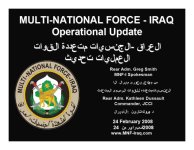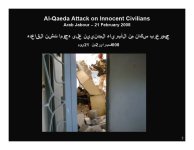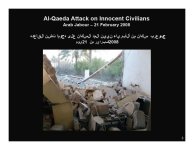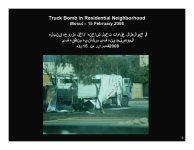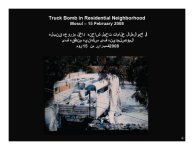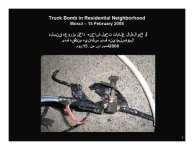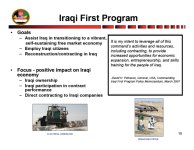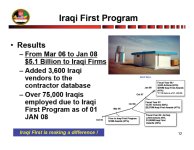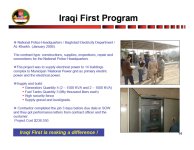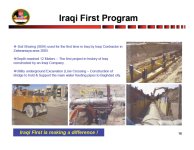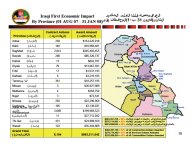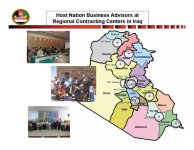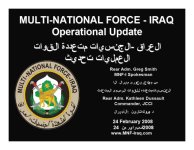
PRESS CONFERENCE: Operational Update: Rear Adm. Smith, Rear Adm. Dussault, Feb. 24, 2008
Multi-National Force-Iraq
PRESS CONFERENCE:
Rear Admiral Gregory Smith, Director of Communications, Deputy Spokesman Multi-National Force - Iraq; Rear Admiral Kathleen Dussault, Commander, Joint Contracting Command – Iraq/Afghanistan.
DATE: February 24, 2008
TRANSCRIBED BY: SOS INTERNATIONAL LTD.
PARTICIPANTS:
RDML SMITH
RDML DUSSAULT
REPORTERS:
ALEXANDRA ZAVIS FROM THE LA TIMES
GINA CHON FROM THE WALL STREET JOURNAL
CARLOS HAHM FORM THE JONS FONT PRESS
ALPERTA PALI FROM IHA
REPORTERS 1-10*REP1 = REPORTER 1
*INT = INTERPRETER
RDML SMITH: Good Afternoon. As-Salāmu `Alaykum. Before I start, I do want to say something about the new studio in terms of the carpeting and the walls and all that. We’ve made a change here to make it more suitable, I think, for all of you to be here. We appreciate you coming every week, couple times, sometimes two or three times a week. We wanted to freshen the place. I think they’ve done a great job, so again, my hat’s off to everyone. Before I formally introduce my colleague—and I’m proud to say fellow US Navy Flag Officer—Rear Admiral Dassualt, I want to take just a few minutes to make a few opening remarks.
On Friday, we joined the government of Iraq in welcoming the news that Muqtada al-Sadr has pledged to extend the ceasefire that has been benefiting the people of Iraq. The extension of the August 2007 pledge of honor to halt attacks is an important commitment that broadly contributes to further improvements in security for all Iraqi citizens. It will also foster a better opportunity for national reconciliation and allow the coalition and Iraqi security forces to focus more intensely on al-Qaida terrorists and other extremist groups. We also view this extension as an opportunity to further construct a dialogue with the Sadr trend and all groups who seek to bring about reconciliation and building a new Iraq. Those who continue to honor the ceasefire pledge will be treated with respect and restraint, and those who choose to do otherwise tarnish both the name and the honor of Sadr trend and his movement and will be dealt with as criminals of the Iraqi people. One such example occurred on Thursday in Basra, as criminal militias attacked a convoy on a humanitarian mission with an Explosively Formed Penetrator, injuring two. One of the injured was from Project Hope, an organization that since 1958 has brought much needed medical care to children all around the world. The other individual injured was a coalition soldier. The group was driving to the new children’s hospital in Basra that is under construction. The Basra Children’s Hospital is being built by the Gulf Region Division of the United States Army Corps of Engineers, and is due to be completed later this year at a cost of $163 million. When complete, it will be a state-of-the-art pediatric oncology hospital, one of the finest in the region. This attack demonstrates, once again, that criminal militias are working to undermine building the new Iraq by attacking the very people who are here to help the Iraqi people achieve that dream. This was not the only incident this week where terrorists indiscriminately injured innocent civilians. On Thursday in Arab Jabour, eight Iraqi civilians – including four women and three children – as well as an Iraqi Army soldier, were wounded in an attack by al-Qaida. As most of you know, Arab Jabour was recently the focus of operations by coalition and Iraqi security forces targeting al-Qaida Iraq. As part of those efforts, a citizen’s volunteer group was formed to consolidate the region’s security gains. Unfortunately, al-Qaida seized a home in the village, taking the innocent resident’s hostage, and then blew up their house. When the victims’ neighbors and Iraqi army soldiers responded, al-Qaida opened up with small arms fire. This is yet another sign of the vicious nature of the enemies that Iraqi people are facing, as well as an indication that there is much work to be done. One area where popular resistance is in full force is up north in the critical crossroads of Mosul. Ongoing joint operations have made significant advances in the past couple of weeks, led by Iraqi Army Lieutenant General Riyadh and Major General Hertling of the coalition force. On the 15th of February, vigilant Iraqi citizens, brave Iraqi Police, and dedicated Coalition forces worked together to prevent what would have been a horrific tragedy. Citizens woke up one day to find a large white truck parked in the residential neighborhood. The truck was parked two blocks from a brand new combat outpost recently opened to provide residents with a center for security right amidst their homes. The truck was covered with a white tarp marked with signs indicating it was a medical vehicle associated with the Red Crescent, a humanitarian aid group. The local residents were suspicious. As they fled to safety, they notified local police, who in turn coordinated coalition assistance. Coalition forces immediately responded and successfully moved the truck to the outskirts of Mosul, where they were able to perform safely a controlled detonation of what turned out to be a giant truck bomb. The truck was loaded with eight 55-gallon drums rigged with detonation cord and thirty 80-pound bags of explosives. Inside the cab, coalition explosives experts found a suicide switch and triggering devices for the explosives in the back. The vigilance of the alert citizens and the quick work of trained explosive experts saved untold lives. Of course, the goal is to take down these networks before they have a chance to park a large truck bomb in a heavily populated neighborhood. On Thursday morning, west of Taji, coalition forces killed a terrorist known as Abu Ibrahim, who was a member of a network responsible for attacks against the people of Baghdad using Improvised Explosive Devices and car bombs. Intelligence showed that Abu Ibrahim supplied suicide bombers, vehicles and logistical support to multiple terrorist networks in the capital. And finally on Friday, the Muslim holy day, we saw another attack that starkly illustrates the depraved nature of al-Qaida and why it is so important to infiltrate these volatile networks. A terrorist strapped on a suicide vest and went to a mosque in Amiriyah, southwest of Fallujah. Once he managed to make his way near several brave Iraqi police who were there to protect the holy site and the innocent worshippers, he blew himself up. The terrorist murdered three Iraqi police officers and one civilian, seriously wounding seven more civilians and a police officer. This terrorist went to a holy site on that day of prayer with the intent to commit mass murder. This is what the Iraqi people are facing, and demonstrates why we must continue our efforts to rid Iraq of such hatred and violence. And now, to talk about some of the positive steps the coalition are taking to support economic development in Iraq, a very necessary component to reducing violence. It is my pleasure to introduce Navy Rear Admiral Kathleen Dussault, Commander, Joint Contracting Command – Iraq/Afghanistan. The Admiral is here to talk to you about her command’s mission, with a special focus on a program called “Iraqi First.” We are also trying out something different today. The briefing on Iraqi First will be delivered in Arabic. At the conclusion of her remarks, we will be happy to take your questions. Admiral Dussault.
RDML DUSSAULT: Thank you Admiral Smith. It’s a pleasure to be here today to talk about the Iraqi First program. I am the commander of the Joint Contracting Command here in Iraq. And the JCC, as we call it, is the procurement arm of Multi-National Forces – Iraq, and last year awarded over 25,000 contracts worth over $4 billion. We have regional contracting centers throughout Iraq, twelve of them from Basra to Baghdad, from Fallujah to Mosul. We provide responsive and effective contracting support of vital supplies, construction and commodities to coalition forces in the relief and reconstruction of Iraq. We pursue business strategies that allow Iraqi firms to play leading roles in rebuilding their nation and restimulating the economy. Iraqi First is our effort to promote economic self-sufficiency within Iraq. And in concert with our host nation business advisors, the Joint Contracting Command works with Iraqi firms to build business capacity and spur economic activity throughout the country. With that brief introduction I’d like to start into our presentation on the Iraqi First program. Thank you.
UF1: First slide please. Speaking in Arabic.
INT: The Iraqi First program was launched as a pilot program in March 2006 by General Casey and reconfirmed as policy for Multi-National Forces – Iraq by General Petraeus in March 2007. In early 2008, the US Congress passed legislation further strengthening the Iraqi First program. The intent of Iraqi First to remove barrier that have prevented Iraqi-owned businesses from competing on a level playing field with larger international companies. Ultimately, the goal of the program is to assist the country of Iraq as it transitions to a vibrant, self-sustaining free market. The Joint Contracting Command does this by providing local business the opportunity to expend capacity so these businesses can meet the needs of the communities they serve. As the situation in Iraq has evolved, JCC has deliberately moved from using large international contractors and is instead utilizing direct fixed-price contracts with local Iraqi vendors and businesses. This strategy strengthens the Iraqi economy, enhances the security environment, gives local workers a best stake in the quality of the finished product, and increases local sources for the future. Currently, there are over 4,100 Iraqi companies registered to do business with JCC, and 85% of those companies have been awarded at least one contract. The program’s progress has been steady and continuous in an upward trend. Before the Iraqi First program, only 74 million (sic) of the JCC contracts were awarded to Iraqi firms. Since October 2006, JCC has added over 3,600 Iraqi businesses to its contractor database. In the first partial year of the program, July-September 2006, Iraqi firms were awarded $1.8 billion. In the second year of the Iraqi First program, from October 2006 to September 2007, Iraqi firms were awarded $2.7 billion. So far this fiscal year, October 2007 until the 31st January 2008, JCC has awarded $519 million to Iraqi firms, and its projections for those year are the same levels as for the previous year. From JCC’s recent census of the 2001, to January 2008, over 75,000 Iraqis are currently employed by Iraqi firms working with Iraqi First program. The total number of the awards from March 2006 through 31st January 2008 exceeded 28,000, and the value of these awards exceeded $5.1 billion. Coalition forces remain committed to supporting this vital program, which continues to assist the growth and expansion of the Iraqi economy. Next slide.
This slide depicts a recent example of an Iraqi-owned company performing work to help rebuild their country. This Iraqi First project awarded by JCC in January 2008 was to supply and install electrical generators to provide power for the fourteen-building national police headquarters complex in Baghdad. A $238,000 project the Iraqi-owned company completed the work ahead of schedule with superior performance, as noted by both the customer and the contracting officer. Next slide.
An early example of an Iraqi company performing work under a JCC contract is the 2005 soil shoring project in Zafaraniyah, a critical project supporting the main water feed pipes for Baghdad. It was the first contract JCC awarded to an Iraqi-owned company to perform reconstruction in Iraq. Three years later, more than 90% of reconstruction projects are awarded to Iraqi-owned companies through the Iraqi First program. Meanwhile, the company is still hard at work today helping to rebuild Iraq. Over the last three years, this Iraqi-owned business has been awarded more than $44.7 million in contracts from the Joint Contracting Command. This is significant economic impact for the company and its employees, their suppliers, and their communities. The Iraqi First program has played a significant role in reviving the Iraqi economy by generating demand for Iraqi manufacturers, suppliers, and service companies. This chart depicts the economic impact by province of Iraqi First expenditure since 2001 to August 2007. JCC awarded $983 million throughout the eighteen provinces as shown on the chart. The $983 million represents over 6,000 contracts awarded to more than 1,300 Iraqi companies. JCC awarded $483 million for construction to Iraqi firms, which represent 92% of all construction contracts awarded in that same period. The $276 million for services awarded to Iraqi firms in support of coalition forces was 25% of all service contracts awarded. JCC awarded $223 million for commodities, which was 60% of commodity contracts awarded going to Iraqi businesses. JCC encourages the Iraqi government to consider implementing a similar program and stand ready to assist in helping to develop such a program in a transparent and economically sustainable manner. The host nation business advisor is part of the JCC’s efforts to support the development of Iraqi business is host nation business advisor program. Through these bilingual…and has participated in business outreaches and development programs throughout the country and the region. Most recently, JCC participated in the Baghdad Business Expo at the al-Rasheed Hotel in Baghdad. JCC’s host nation business advisors conduct regular training with our Iraqi vendors and the local business communities on how to register and contract with them. They foster good working relationships and build cooperative partnerships between coalition forces and local Iraqi companies in their communities. Hopefully, this brief has provided you with an overview of the positive economic impact that JCC has held on the Iraq economy through its Iraqi First program and use of host nation business advisor. We again encourage the Iraqi government to develop its own version of a Buy Iraqi First program in order to stimulate growth and economic self-sufficiency with Iraq. Thank you.
RDML SMITH: Thank you Nevin, appreciate that. Questions please. Yes sir.
REP1: Asking question in Arabic.
INT: Question from the Iraqi Freedom Radio. The Turkish troops are conducting an operation in northern Iraq in Kurdistan. And this attack targeted one of the bridges in al-Amadiyah area. What is the stance of the multi-national forces from the nature of this attack or military operation? Because the media said the Turkish troops received a green light from the United States to conduct such an operation.
RDML SMITH: I think it best if I refer any questions on that particular operation to the spokesman at the US Embassy in Ankara, who would be better positioned to discuss any issues or any discussion it may have had with the government of Turkey. And so I’ll pass you to them for any comment please. Thank you.
ZAVIS: Hi. Alexandra Zavis from the LA Times. Do you have any details on the clashes that have been taking place in Dora since yesterday? We’ve been getting sort of mixed reports about an attack this morning on pilgrims and some clashes between Awakening groups and armed groups that were escorting the pilgrims.
RDML SMITH: I’ve not seen the operation report this morning. I left about an hour ago from the office and had not gotten any updates on that subject. So, if we do we’ll make sure we pass them on to you, but nothing that I have right now. Yes, sir.
REP2: Asking question in Arabic.
INT: Question from Arabiyah newspaper. What the JCC is doing from all humanitarian work and what the Iraqi citizen had witnessed, could you increase these contracts, especially those that are dedicated to the Iraqi citizen?
RDML DUSSAULT: Yes, that’s a very good question. There is enormous opportunity to increase the amount of work that we do within the country of Iraq and to engage Iraqi businessmen in a number of different areas. One of the statistics you might have noticed where there’s work to be done is in the number of services contracts that we engage with Iraqi businesses on. So, I think there’s a lot of opportunity there. Currently services contracts have to do with providing maintenance and repair types of services, custodial services, that sort of thing. And we do that in companionship with the bases that we have all throughout Iraq. So the base commanders are working with us to provide more opportunities to employ more Iraqi civilians to provide those kind of capabilities. One of the other programs we have that we work very closely with some of our coalition compatriots is called the Iraqi Business Industrial Zone. And that’s a concept where we provide real estate in consonance with the bases that we have, where Iraqi businessmen can come in, set up there facilities and provide repair and rehabilitation services to our equipment. They can provide custodial types of facilities. So, they’re in close contact with our bases and can provide service support on contracts basis to our forces. So there are many additional opportunities to work with Iraqi businesses. Thank you.
CHON: Gina Chon, Wall Street Journal. In terms of the JCC encouraging the Iraqi government to have a similar program, has there actually been any talks with the Iraqi government to set up such a program? Or is this just something that you would encourage but hasn’t really moved anywhere? And then I actually have a question for Admiral Smith. I know you said in regards to talks with Turkey and the US that that would be for the US Embassy to address. But in terms of what you had said about US being assured that Turkey was going to do everything to limit civilian casualties or damage to infrastructure, it seems over the weekend that both the Kurdish government and the Iraqi government are showing their impatience already. And there are reports that this operation could last as long as fifteen days. Is there anything the US from the military perspective here is doing to sort of try to engage Turkey or trying to get additional assurances or something that would sort of calm some of the officials here down?
RDML DUSSAULT: I’ll answer the question on our engagement with Iraqi government on increasing JCC possibilities. And there has been some very productive discussions. We’ve done a number of presentations at the Council of Ministers, and we briefed the Deputy Prime Minister just recently about additional possibilities to expand the program. And he was very enthusiastic in that regard and has sponsored some additional outreach sessions in terms of business conferences, similar to the Baghdad Business to Business Forum that we just engaged in just last week. And that forum was very, very successful. Over 3,000 businesses were in presence there. Booths providing a display of their products, and I think a number of additional opportunities will come out of that. But the Iraqi government very interested in participating in this.
RDML SMITH: Regarding Turkey again. The direct discussions with Turkey and any commitments made on either side would be done between the Turkish Government and the Government of Iraq. And any US discussions would have been at the Embassy level back in Ankara. And so again I’d have to refer you back to them for comment. From the MNF-I perspective, we’re certainly monitoring activity in the north, but we do not have a direct role in working with the Turkish Government as to what their plans are. Sir, front row.
REP3: Well, when Turkey does stage attacks on the northern border there and they do come into Iraqi territory, do they notify the US military so that there are no misunderstandings between the two armies? I mean, do you know ahead of time that they’re coming over the border?
RDML SMITH: The US is notified, and MNF-I receives that notification. That’s correct. You know, we do not have forces in the north. And we monitor that airspace for aircraft to fly in. We certainly can monitor other activity, but we don’t have any direct forces in the region.
REP3: And do they tell you the size of the force that’s going over the border when they notify you of their impending attacks?
RDML SMITH: I don’t know what the specific notification looks in terms of form, it takes in terms of its discussions with officials in Ankara. But I suspect there’s a discussion as to size and scope and scale. Yes, sir.
REP3: And can you share with us any information about the scope of that attack in the north?
RDML SMITH: I’d refer again, refer you back to the Turkish government for comment on that.
HAHM: Yes, Admiral. Carlos Hahm with the Jons Font Press. How many…in preparation for the visit of the Iranian leader Mahmoud Ahmadinejad, how many Iranians are currently in custody by the US forces? And are any going to be released? And also, if there are any special preparations your making for the visit?
RDML SMITH: The visit, as I understand it, is obviously being hosted by the Iraqi government. And the US has no direct connection with that particular visit at this time. As to terms to the number of Iranians that are in detention, I believe the number is nine that remain in detention. And if there’s any release of Iranian detainees, it would be coincident with those individuals no longer being a threat to security of Iraq as opposed to any particular visit by an Iranian official. Yes, sir.
REP4: Asking question in Arabic.
INT: Question from Kul al-Iraq newspaper. Do you have any intention to release the detainees from the fighters of Jaish al-Mahdi in exchange for the ceasefire that has been announced?
RDML SMITH: There have been, over time, several Shia and Sunni that have been released out of coalition detention, over 8,000 last year. 300 just in the few weeks ago, in which half those were Shia. We don’t distinguish between members of Jaish al-Mahdi or any other group; it’s individuals who we assess and their threat of security to Iraq that’s judged. And those that do not pose a threat to Iraq’s security are the ones being released. So, you’ll see in the coming months and weeks ahead continued efforts to identify individuals in coalition detention who are not a threat, have an opportunity to go through a reintegration program, sign a pledge of honor to Iraq to be a peaceful citizen of Iraq, and they will return home. Much as they have in the past.
REP5: Asking question in Arabic.
INT: Question from the Iraqi Media Union. Don’t you think that the Turkish operation in Kurdistan has a direct impact on the Iraqi-Turkish trade or commercial aspects? And the second question. The Iranian president intends to visit Iraq. What is the stance of the American administration for that? And do you think the Iranian president is here to discuss the release of Iranians or what?
RDML SMITH: Again, the answer to your second question, which I just answered a moment ago, the visit of any Iranian official to Iraq would be hosted by the Iraqi government, not by the US. And I refer any comments regarding that, in terms of US position, back to Washington. And again on the issue of Turkey’s current operations in the north and whether or not they have any impact on trade with Iraq, I would point you to the government of Iraq to answer such a question for you. Any questions please. Yes, all the way in the back.
REP6: Asking question in Arabic.
INT: The Iraqi infrastructure is still not good. And the reconstruction that is being done so far is being destroyed by al-Qaida now. What do you think is the best solution to resolve all this? The second question, what is your plans to help the displaced families? Will you help them through providing some of the things they lost?
RDML SMITH: Well, you know, we’ve had a concerted effort along with the Iraqi security forces to deal with al-Qaida. Their destruction of infrastructure has been one of the more destructive parts of their campaign here in Iraq. It has been indiscriminate. It has served little or no military purpose. It has only been done to impede, in most cases, commerce and travel of the average Iraq. The Government of Iraq and the coalition are in the process of rebuilding much of that infrastructure that was destroyed, both the bridges, power generation systems, and so forth. And we’ll continue to do so. But the goal here is to eliminate the threat by reducing the ability of al-Qaida to conduct those operations. And I think we’re having some impact against that. There has been a reduction in the number…in the frequency of their attacks on infrastructure, but they still obviously can do that. That large truck bomb I mentioned in Mosul, had it been used it might have been used against infrastructure. We don’t know. It was clearly wired to be a suicide truck bomb. So, we have to interdict the network before the bombs are driven over a bridge. It’s very difficult to stop if that occurs. If you can go after the network, you can have the impact, and I think we’re having some impact on that. As far as the Iraqi displaced persons, the Government of Iraq is firmly involved in developing a program to integrate displaced persons back to their homes. Various parts of our coalition force also are generating programs that allow Iraqis to, over a period of several days, verify their residency, proof of residency, to make sure we have the right family in the right home, and go through a multiple-step process that ensures that we’re not displacing other individuals out of their homes. And that’s going to take time. But in the end, this will be a program that the Government of Iraq will institute. And I know that they’re coming up with measures to do so.
PALI: This is IHA, Alperta Pali my name. Sir, I’m afraid you’ll show me the same address again. But the Secretary of State said yesterday that Turkey is fighting against the common enemy. I want to ask, is there a possibility that the US Army can support the Turkish army in any way in the next ways?
RDML SMITH: Yeah, again I’ll refer you…that would be the decision that would ultimately be made at levels much higher than Multi-National Force – Iraq. And so I’d again point you back to Washington in this case regarding any comments about US commitments beyond what we already have said. Yes, sir.
REP7: Asking question in Arabic.
INT: In case there was a clashes between the Turkish and the Peshmurga, what is your stance? And the Kurdish official in Kurdistan told the, issued an order to the Peshmurga to defend Kurdistan. So again, what is your comment about this?
RDML SMITH: Again, I appreciate everyone trying to ask questions on Turkey, but I’m afraid you’re going to hear the same answer regardless of what you ask. It is really not in my place or position to be talking about what’s happening with Turkey. You can understand that that’s a sovereign nation that’s made a choice about what it’s doing in northern Iraq to go against a common enemy, the PKK. It is on Iraqi sovereign soil. There will be a discussion between the government of Iraq and the government of Turkey. Multi-National Force – Iraq has a role here in Iraq to provide security, but it is not associated with the particular operations ongoing in northern Iraq. I’ll leave it at that. Any other questions? Yes, sir.
REP8: Asking question in Arabic.
INT: The general amnesty that was passed by the Council of Representatives, does that include the detainees in the American detention facilities?
RDML SMITH: The current…the draft of the laws that’s written does not involve US or coalition detainees. The amnesty is designed for Iraqis in Iraqi prison and detention facilities. Any other questions? Yes, sir.
REP9: Asking question in Arabic.
INT: Yesterday, the Green Zone was attacked by rockets, and Baghdad as well there was an increase, or an up-tick by the armed attacks and explosions like the attack in Kureta. Is this an indication that al-Qaida is still working in Baghdad? And who’s standing behind yesterday’s attack?
RDML SMITH: You phrased the question in two parts. One was the indirect attacks against the Green Zone, and was this an indication of al-Qaida. And then you asked who responsible. So I’ll try to answer your question by saying that the indirect attacks yesterday we don’t know precisely who was responsible as an individual yet, but we suspect it was, again, rogue criminal militia groups that led those attacks. We’ll find out. Al-Qaida, though, does continue to pose a threat. And we understand that if given the opportunity, used indirect fire, and have used indirect fire. But typically here in Baghdad in terms of the attacks we’ve seen in the past, those have been done by other groups outside of al-Qaida. Any other questions? Yes sir.
PALI: Alperta Pali again. We were talking about local investors. I want to ask, when is Iraq ready for big investors from outside? Just like AOL for example, because the Internet service here is very bad.
RDML DUSSAULT: That’s a very good question as well. And we’re seeing some very hopeful signs in terms of large investors, large multinational investors showing great interest in a very vibrant consumer base here in Iraq. So, Mercedes-Benz has talked about locating some capabilities here. Caterpillar, which is a major producer of farm, agricultural equipment, has talked about a number of opportunities. I think the time is right. There are a number of opportunities, and I think there’s some great examples of interest of very, very large companies. I don’t know about AOL. We can always ask and see what their interest level is. That’s a very good suggestion, so thank you.
RDML SMITH: I do know that this past week, there was a conference down in Dubai in which Iraq was well attended in terms of participation. And part of that conference was to focus on bringing technologies to Iraq, especially in the information technology area. That’s the backbone of any growing nation’s economy. And I suspect there’s lots interest in doing that. If there are no other questions, we’ll have another conference later this week, probably on Wednesday. See you all then. Shukran.
REP10: Excuse me…[asking question, unintelligible]
RDML SMITH: I’ll take the question afterwards. Thank you very much.
|
NEWSLETTER
|
| Join the GlobalSecurity.org mailing list |
|
|
|


